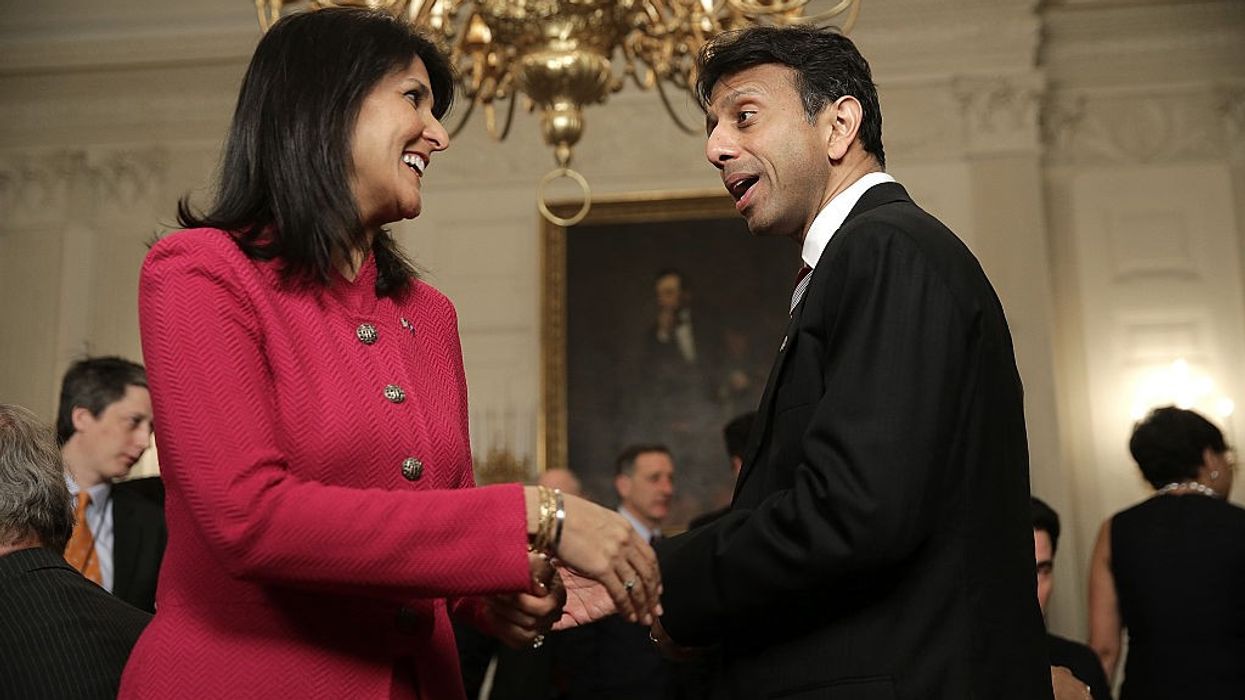INDIAN-AMERICAN Bobby Jindal, the former governor of Louisiana state, came out in defence of White House hopeful Nikki Haley, saying she should not be criticised or praised for her gender or ethnicity.
Jindal was the first Indian-American to have entered the race for US presidency in 2016.
He dropped out in the early stages of the Republican primary, which was eventually won by former president Donald Trump.
Haley, 51, is the two-term governor of South Carolina and the former US ambassador to the UN.
The Indian-origin Republican leader formally launched her 2024 presidential bid on February 15, casting herself as a younger and fresher alternative to the 20th century politicians like her one-time boss and former president Trump.
But in less than a fortnight after she entered the 2024 race, Haley was subjected to attack based on her ethnicity, race and gender, sometimes even from her own Republican party supporters.
"Liberals have reduced Haley's candidacy to the candidate's gender and ethnicity - unsurprising given their obsession with identity politics. Conservatives should avoid falling into this same trap," Jindal wrote in an op-ed in Newsweek magazine.
"Nikki Haley should not be criticised or praised for being an Indian-American woman running for president; the fact she was born female and to Indian immigrants is not the most important thing to know about her," he argued.
Jindal wrote that any candidate offering themselves to lead our nation should expect harsh scrutiny, and everything seems like fair game in modern campaigns.
"Candidates once expected the media and voters to respect personal matters as out of bounds, but that zone of privacy shrinks smaller and smaller with each campaign - especially as candidates share more and more personal information via social media," he wrote.
"Liberals who thought voters should elect Hillary Clinton president because previous officeholders were male - and then criticised the electorate as sexist for failing to do so - are horrified at the possibility Haley could be the first female president," he explained.
Referring to the series of attacks against Haley, Jindal said these attacks only benefit the campaign in the short term, as the national media attention improves, it gives reporters and voters a reason to keep discussing her candidacy.
"Trump's election proved the incredible power of free earned media attention, especially in a presidential election governed by saturation coverage. However, reducing Haley's candidacy to her gender and ethnicity limits her ability to transcend those categories and build a broader coalition," he further wrote.
Haley is the third Indian-American to run for the US presidency in three consecutive election cycles after Jindal and vice-president Kamala Harris.
"Running as a female minority candidate blesses her with a higher floor than other candidates struggling to differentiate themselves, but could also condemn her with a lower ceiling if voters don't get the chance to examine her credentials and ideas," he added.
Haley was born Nimrata Nikki Randhawa to Sikh parents Ajit Singh Randhawa and Raj Kaur Randhawa, who had emigrated from Punjab to Canada and then to the US in the 1960s.
In an e-mail to her supporters, Haley described herself as a proud American and a grateful citizen.
"I am a conservative. I am a mom. And soon a mother-in law! I am a runner. I am an unabashed Clemson Tigers fan. I've served as governor of the great state of South Carolina and as America's ambassador to the United Nations and I'm a grateful citizen who knows our best days are yet to come, if we unite and fight to save our country," she said.
At 39, Haley was the youngest governor in the US when she took office in January 2011, and made history as South Carolina's first female governor.
She was also the state's first Indian-American governor who would go on to serve for two terms.
(PTI)





